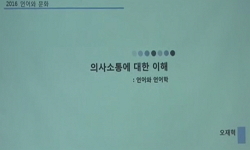After the Manchurian Incident on September 18, 1931, Japan officially began to invade northeastern China. From this point, the Northeast Writers' Group has begun to publish works. They show actively interest in China, which is in crisis. In particular...
http://chineseinput.net/에서 pinyin(병음)방식으로 중국어를 변환할 수 있습니다.
변환된 중국어를 복사하여 사용하시면 됩니다.
- 中文 을 입력하시려면 zhongwen을 입력하시고 space를누르시면됩니다.
- 北京 을 입력하시려면 beijing을 입력하시고 space를 누르시면 됩니다.

수췬(舒群)의 「조국이 없는 아이」의 주인공 골리(果里)의 저항 양상 = Resistance of Goli, the main character of Sujin's 「Child Without a Fatherland」
한글로보기https://www.riss.kr/link?id=A107395707
- 저자
- 발행기관
- 학술지명
- 권호사항
-
발행연도
2021
-
작성언어
-
- 주제어
-
KDC
800
-
등재정보
KCI등재
-
자료형태
학술저널
- 발행기관 URL
-
수록면
81-110(30쪽)
-
KCI 피인용횟수
0
- DOI식별코드
- 제공처
-
0
상세조회 -
0
다운로드
부가정보
다국어 초록 (Multilingual Abstract)
The representative writer of the Northeast Writers' Group, Shuqun, was born in Harbin in 1913. And in 1936, Shu published 「Child Without a Fatherland」, revealing his ideology of homeland. So far, there is a lot of research on this work, but detailed analysis is somewhat insufficient. In particular, there are many things should be paid attention to about the main character Goli. Goli was a person who fled to Manchuria from Joseon (Korea) and he has been running away to live just for a better life. but he has to live the same miserable life in Manchuria as when he was in Joseon. Goli was constantly resisting even in this miserable life. The author reveals Goli's ideology of homeland by organizing descriptions of cattle, murdering, national flag, and language issues. The author tried to recreate the link between Joseon and China through these ideologies, but it is also not a successful reenactment.
However, this attempt is consistent with the Northeast Writers' Group. The writers of the Northeast Writers' Group always emphasize the ideology of anti-Japanese link and awaken the Chinese people. The text is going to analyze Goli with the above-mentioned issues.
After the Manchurian Incident on September 18, 1931, Japan officially began to invade northeastern China. From this point, the Northeast Writers' Group has begun to publish works. They show actively interest in China, which is in crisis. In particular, sympathy for neighboring countries Joseon and Koreans in similar situations is often expressed in the works of Northeast writers.
The representative writer of the Northeast Writers' Group, Shuqun, was born in Harbin in 1913. And in 1936, Shu published 「Child Without a Fatherland」, revealing his ideology of homeland. So far, there is a lot of research on this work, but detailed analysis is somewhat insufficient. In particular, there are many things should be paid attention to about the main character Goli. Goli was a person who fled to Manchuria from Joseon (Korea) and he has been running away to live just for a better life. but he has to live the same miserable life in Manchuria as when he was in Joseon. Goli was constantly resisting even in this miserable life. The author reveals Goli's ideology of homeland by organizing descriptions of cattle, murdering, national flag, and language issues. The author tried to recreate the link between Joseon and China through these ideologies, but it is also not a successful reenactment.
However, this attempt is consistent with the Northeast Writers' Group. The writers of the Northeast Writers' Group always emphasize the ideology of anti-Japanese link and awaken the Chinese people. The text is going to analyze Goli with the above-mentioned issues.
참고문헌 (Reference)
1 공진성, "폭력" 책세상 2009
2 박진임, "포스트콜로니얼리즘과 여성- 안수길의 <새벽>, <북간도>, <원각촌>을 중심으로 -" 한국현대문학회 (17) : 285-318, 2005
3 임채성, "중동철도에서의 사업전개와 경영실태-아사다 마사후미(麻田雅文)의 『中東鉄道経営史:ロシアと「満州」1896-1935』를 읽고-" 만주학회 (16) : 259-272, 2013
4 홍정선, "중국문학 속의 한국" 소명출판 2017
5 金易, "좌련과 좌익문학의 역사지위(左联与左翼文化的历史地位)"
6 브라이언 마수미, "정동정치" 갈무리 2018
7 이경림, "자살과 살인 사이 -1920년대 소설과 폭력의 새벽-" 반교어문학회 (51) : 15-48, 2019
8 김윤식, "안수길" 志學社 1985
9 테리 이글턴, "민족주의, 식민주의, 문학" 인간사랑 2011
10 고바야시 히데오, "만철-일본제국의 싱크탱크" 산처럼 2004
1 공진성, "폭력" 책세상 2009
2 박진임, "포스트콜로니얼리즘과 여성- 안수길의 <새벽>, <북간도>, <원각촌>을 중심으로 -" 한국현대문학회 (17) : 285-318, 2005
3 임채성, "중동철도에서의 사업전개와 경영실태-아사다 마사후미(麻田雅文)의 『中東鉄道経営史:ロシアと「満州」1896-1935』를 읽고-" 만주학회 (16) : 259-272, 2013
4 홍정선, "중국문학 속의 한국" 소명출판 2017
5 金易, "좌련과 좌익문학의 역사지위(左联与左翼文化的历史地位)"
6 브라이언 마수미, "정동정치" 갈무리 2018
7 이경림, "자살과 살인 사이 -1920년대 소설과 폭력의 새벽-" 반교어문학회 (51) : 15-48, 2019
8 김윤식, "안수길" 志學社 1985
9 테리 이글턴, "민족주의, 식민주의, 문학" 인간사랑 2011
10 고바야시 히데오, "만철-일본제국의 싱크탱크" 산처럼 2004
11 董興泉, "舒群研究資料" 春風文藝出版社 1988
12 董興泉, "舒群文學創作的思想藝術特色" (5) : 15-18, 1986
13 史建國, "舒群年譜" 作家出版社 2013
14 권익호, "皇姑屯 사건과 張學良의 東北易幟" 한국중국학회 (86) : 157-188, 2018
15 김지환, "中東鐵道新聞資料集成" 學古房 2015
16 金柄珉, "中國現代文學與韓國2" 延邊大學出版社 2014
17 金柄珉, "中國現代文學與韓國1" 延邊大學出版社 2014
18 陳漱渝, "80년이 지났는데 우리는 왜 좌련을 기념해야 될까?(80年了, 我们为什么还要纪念左联?)"
19 이현정, "1930년대 동북작가군 항일문학의 서발터니티와 재현의 문제― 팔월의 향촌, 생사의 장, 조국이 없는 아이를 중심으로" 한국중국현대문학학회 (61) : 31-56, 2012
동일학술지(권/호) 다른 논문
-
1950년대 신쾌동류 거문고산조 선율에 관한 고찰 -진양조 음악구조를 중심으로-
- 한민족문화학회
- 이형환 ( Lee Hyung-hwan )
- 2021
- KCI등재
-
자율·자치·우정의 공동체를 조직하는 뉴노멀 시대의 인문학
- 한민족문화학회
- 김주현 ( Kim Ju-hyeon )
- 2021
- KCI등재
-
한국어 학습자의 설명문 쓰기에 나타난 내용 조직 양상 분석
- 한민족문화학회
- 권태현 ( Kwon Tae-hyun )
- 2021
- KCI등재
-
팬데믹 지구촌에서 본 이일분수(理一分殊)의 원리와 소통의 생명미학(生命美學)-본체론적 사유의 사회공학적 접근-
- 한민족문화학회
- 김연재 ( Kim Yon-jae )
- 2021
- KCI등재
분석정보
인용정보 인용지수 설명보기
학술지 이력
| 연월일 | 이력구분 | 이력상세 | 등재구분 |
|---|---|---|---|
| 2027 | 평가예정 | 재인증평가 신청대상 (재인증) | |
| 2021-01-01 | 평가 | 등재학술지 유지 (재인증) |  |
| 2018-01-01 | 평가 | 등재학술지 유지 (등재유지) |  |
| 2015-01-01 | 평가 | 등재학술지 유지 (등재유지) |  |
| 2011-01-01 | 평가 | 등재학술지 유지 (등재유지) |  |
| 2010-02-11 | 학회명변경 | 영문명 : The Learned Society of the Korean Culture -> The Association for Korean Cultural Studies |  |
| 2010-02-11 | 학술지명변경 | 외국어명 : THE Korean Culture Journal -> The Review of Korean Cultural Studies |  |
| 2008-01-01 | 평가 | 등재학술지 선정 (등재후보2차) |  |
| 2007-07-02 | 학술지명변경 | 외국어명 : A study of Han Min Jok's culture -> THE Korean Culture Journal |  |
| 2007-01-01 | 평가 | 등재후보 1차 PASS (등재후보1차) |  |
| 2005-06-16 | 학회명변경 | 영문명 : The Learned Society Of Han-Min-Jok'S Culture -> The Learned Society of the Korean Culture |  |
| 2005-01-01 | 평가 | 등재후보학술지 선정 (신규평가) |  |
학술지 인용정보
| 기준연도 | WOS-KCI 통합IF(2년) | KCIF(2년) | KCIF(3년) |
|---|---|---|---|
| 2016 | 0.6 | 0.6 | 0.57 |
| KCIF(4년) | KCIF(5년) | 중심성지수(3년) | 즉시성지수 |
| 0.59 | 0.59 | 1.042 | 0.14 |




 KCI
KCI KISS
KISS






